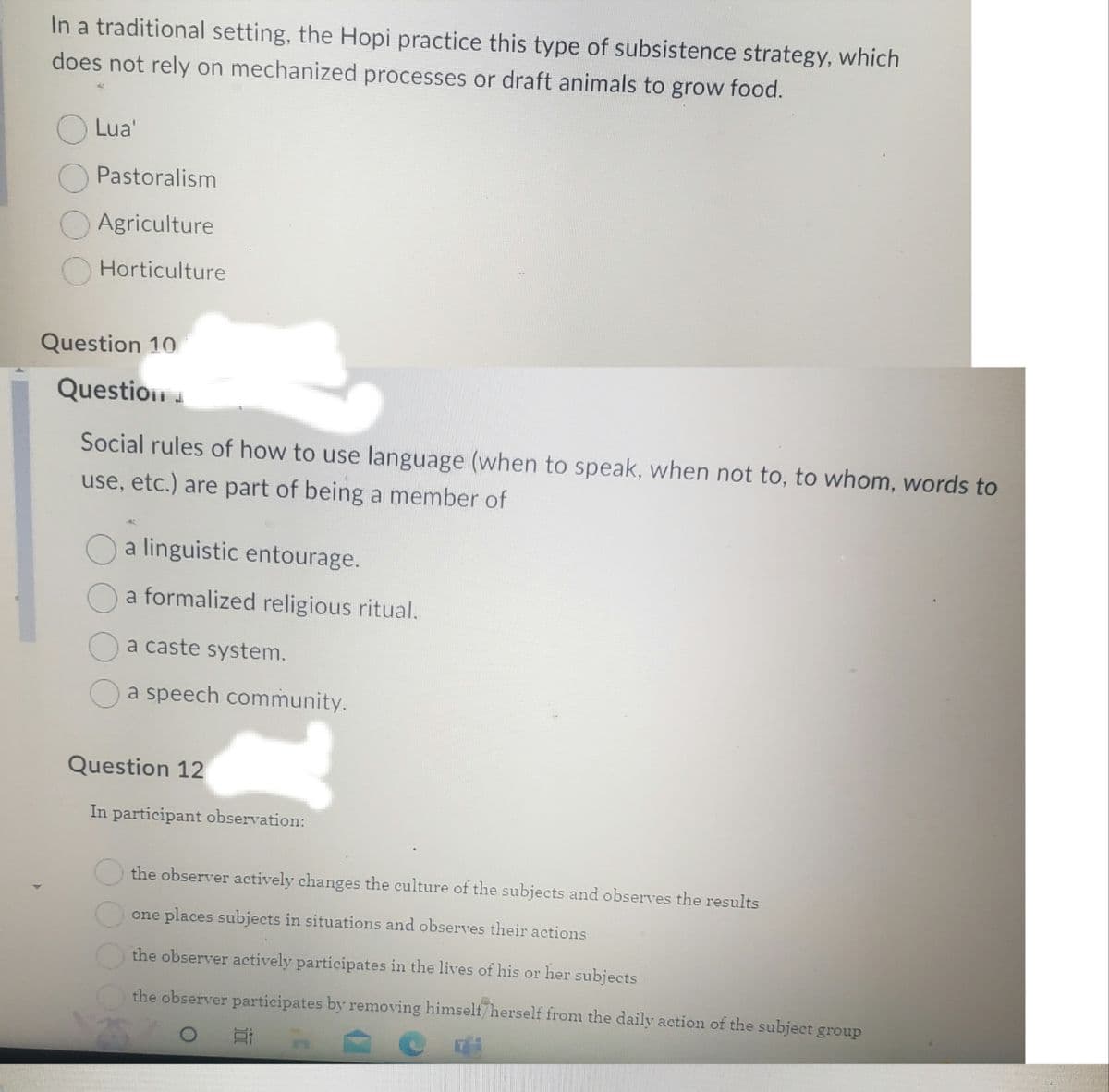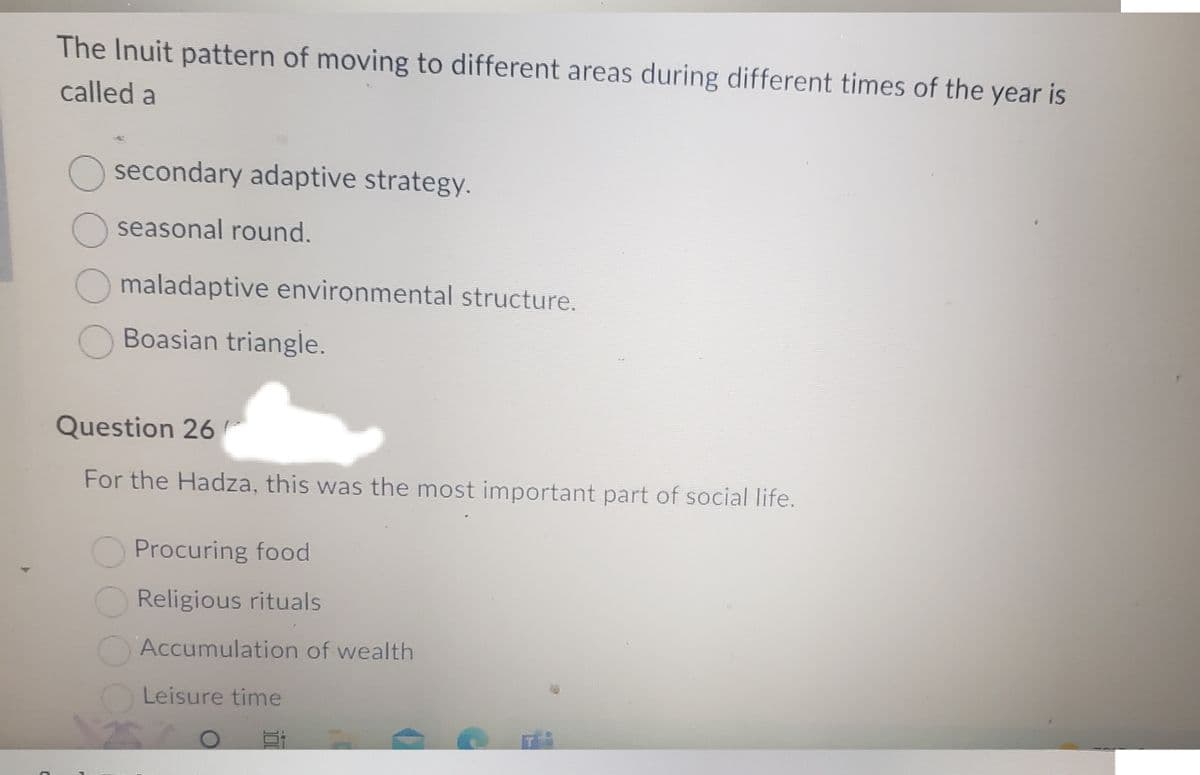In a traditional setting, the Hopi practice this type of subsistence strategy, which does not rely on mechanized processes or draft animals to grow food. Lua' Pastoralism Agriculture Horticulture Question 10 Question
In a traditional setting, the Hopi practice this type of subsistence strategy, which does not rely on mechanized processes or draft animals to grow food. Lua' Pastoralism Agriculture Horticulture Question 10 Question
Social Psychology (10th Edition)
10th Edition
ISBN:9780134641287
Author:Elliot Aronson, Timothy D. Wilson, Robin M. Akert, Samuel R. Sommers
Publisher:Elliot Aronson, Timothy D. Wilson, Robin M. Akert, Samuel R. Sommers
Chapter1: Introducing Social Psychology
Section: Chapter Questions
Problem 1RQ1
Related questions
Question

Transcribed Image Text:In a traditional setting, the Hopi practice this type of subsistence strategy, which
does not rely on mechanized processes or draft animals to grow food.
▶
Lua'
Pastoralism
Agriculture
Horticulture
Question 10
Question
Social rules of how to use language (when to speak, when not to, to whom, words to
use, etc.) are part of being a member of
a linguistic entourage.
a formalized religious ritual.
O a caste system.
a speech community.
Question 12
In participant observation:
the observer actively changes the culture of the subjects and observes the results
one places subjects in situations and observes their actions
the observer actively participates in the lives of his or her subjects
the observer participates by removing himself/herself from the daily action of the subject group
25
At n

Transcribed Image Text:C
The Inuit pattern of moving to different areas during different times of the year is
called a
O secondary adaptive strategy.
seasonal round.
O maladaptive environmental structure.
Boasian triangle.
Question 26
For the Hadza, this was the most important part of social life.
Procuring food
Religious rituals
Accumulation of wealth
Leisure time
E
Expert Solution
This question has been solved!
Explore an expertly crafted, step-by-step solution for a thorough understanding of key concepts.
This is a popular solution!
Trending now
This is a popular solution!
Step by step
Solved in 3 steps

Recommended textbooks for you

Social Psychology (10th Edition)
Sociology
ISBN:
9780134641287
Author:
Elliot Aronson, Timothy D. Wilson, Robin M. Akert, Samuel R. Sommers
Publisher:
Pearson College Div

Introduction to Sociology (Eleventh Edition)
Sociology
ISBN:
9780393639407
Author:
Deborah Carr, Anthony Giddens, Mitchell Duneier, Richard P. Appelbaum
Publisher:
W. W. Norton & Company

The Basics of Social Research (MindTap Course Lis…
Sociology
ISBN:
9781305503076
Author:
Earl R. Babbie
Publisher:
Cengage Learning

Social Psychology (10th Edition)
Sociology
ISBN:
9780134641287
Author:
Elliot Aronson, Timothy D. Wilson, Robin M. Akert, Samuel R. Sommers
Publisher:
Pearson College Div

Introduction to Sociology (Eleventh Edition)
Sociology
ISBN:
9780393639407
Author:
Deborah Carr, Anthony Giddens, Mitchell Duneier, Richard P. Appelbaum
Publisher:
W. W. Norton & Company

The Basics of Social Research (MindTap Course Lis…
Sociology
ISBN:
9781305503076
Author:
Earl R. Babbie
Publisher:
Cengage Learning

Criminalistics: An Introduction to Forensic Scien…
Sociology
ISBN:
9780134477596
Author:
Saferstein, Richard
Publisher:
PEARSON

Sociology: A Down-to-Earth Approach (13th Edition)
Sociology
ISBN:
9780134205571
Author:
James M. Henslin
Publisher:
PEARSON

Society: The Basics (14th Edition)
Sociology
ISBN:
9780134206325
Author:
John J. Macionis
Publisher:
PEARSON